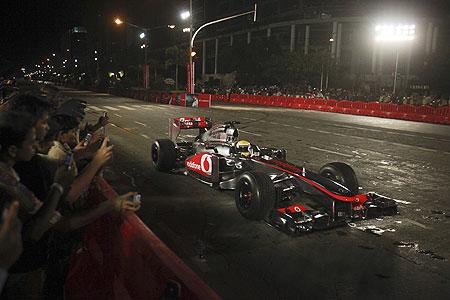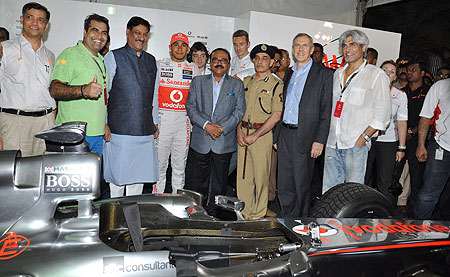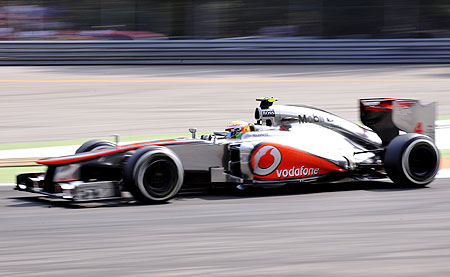 | « Back to article | Print this article |
'I need to focus on giving my 100 per cent with McLaren'
When he was just 10, he walked up to McLaren boss Ron Dennis and expressed his dream to race for the team.
Three years later, he was a member of the British outfit.
In his first year in Formula One (2007), he finished second in the Driver's championships, behind Finland's Kimi Raikkonen.
A year later, Lewis Hamilton became the youngest driver to win the F1 world title.
The last three seasons have been erratic (read disappointing) for the Briton, but he is back in the scheme of things again this year.
Wins in Canada, Hungary and Italy have moved him up to second place in the Driver's championship -- behind Ferrari's Fernando Alonso -- even when speculation is rife that he will no longer be a part of the McLaren team next season. (A lucrative deal with Mercedes is on the cards).
On the sidelines of a promotional event in Mumbai, Hamilton spoke with Rediff.com's Bikash Mohapatra about F1, his immediate goal and future.
Have you reached a deal with the Mercedes team yet?
No.
By when can we expect the announcement?
There's no set time as such. My focus now is to win the World championship. Of course, I have to have these things sorted out. But I do have people working in the background, who are involved in the negotiations and are working on the contractual issues. There are a lot of speculations and stories out there that aren't true. The most important thing is I need to focus on giving my 100 per cent with this team (McLaren) and taking the title challenge forward. I have been with this team since I was 13 and worked so hard towards winning the title in 2008. Now we are again in position where we have a chance. So it is important not to get distracted.'This has been the best year probably for all the teams'
There's a lot being written about your changing equation with the McLaren team and Ron Dennis. Can you elaborate on the topic?
We are wise enough to understand that what people write isn't necessarily true. We have to be wary of that, though. My relationship with Ron goes back a long time, since I was 10. So it's almost 18 years. I don't have a lot of interaction with Ron these days because Martin (Whitmarsh) is the boss. But I get to see him occasionally when he comes to meet the shareholders.
It's already second half of the season and there's still no clear favourite for the driver's title. What is the reason?
My guess is as good as yours. Maybe, it has got to do with a few changes. They have made a change of regulations, back in 2009, to make the races close contests, to not have one team disappearing to the distance. This has been the best year probably for all the teams. At least, for half the teams involved it has been their best performances ever.
You were on pole for the first two races of the season (Australia and Malaysia) and also missed out on points otherwise, that would have consolidated your position. Are you disappointed with your lack of fortune?
I don't consider myself unfortunate. I came from nowhere to win a World championship. Even this year it has been the same. Of course, we lost a lot of points at the beginning of the year. We were in the front row for the first seven-eight races and we should have won more than we actually did. I thought we should have won at Barcelona. But we learn from them and that's what makes racing so exciting. We are in a very good position now and we are getting stronger. We will do well in the remaining races.'You cannot win an F1 race with a crap car'
It is said that if you have a good car in Formula One, half the battle is won. Do you agree?
Well, of course. When you go through the lower categories, cars are more or less the same. It is never 100 per cent similar, but when you go from one team to another you find a smarter and more practical engineer. But, in F1, everyone has different cars. So the cars, particularly in the back rows, might not look that great. All the drivers in F1 are great drivers. So in F1 the car definitely plays a huge part. You cannot win with a crap car.
So what role does the driver play?
People always ask me as to how much is the car and how much is the driver and it is very difficult to explain. There's a fine line between the two. The team invests a lot of money to buy one-tenth of a second and if your driver can buy you half a second then you have that gap on your rival. You always aim to have that gap. That's the difference we drivers make.
You are known to be an aggressive driver. How do you draw a line between aggression and caution?
We know there's a fine line in F1 as you are travelling at incredible speed and can't think so far ahead. So crashes can happen at any time.
When you are travelling at 150 miles an hour, with half a metre (or a meter) difference between you and the guy on the front, and he breaks a couple of seconds ahead of you and you have to react to that, it is difficult. Sometimes you don't get it right.
So it is difficult every time. However, besides being aggressive one has to also be respectful to the other drivers. We all want to get home safely (smiles).

